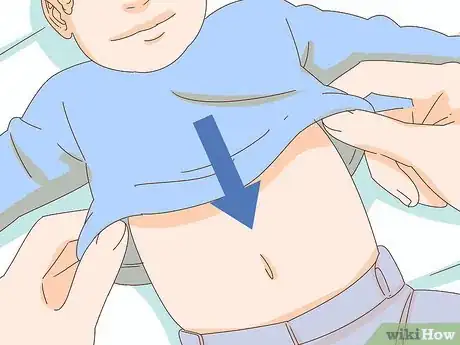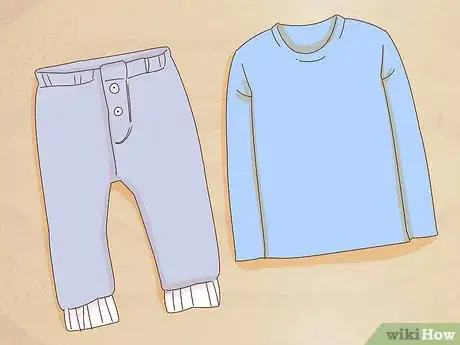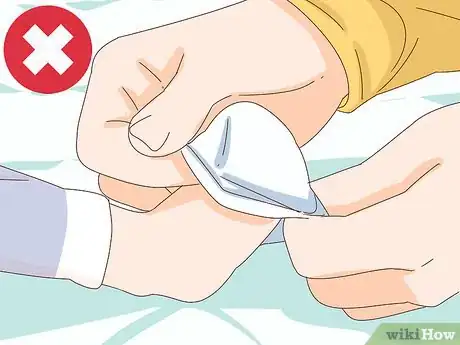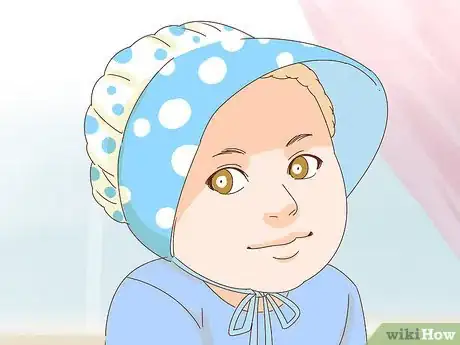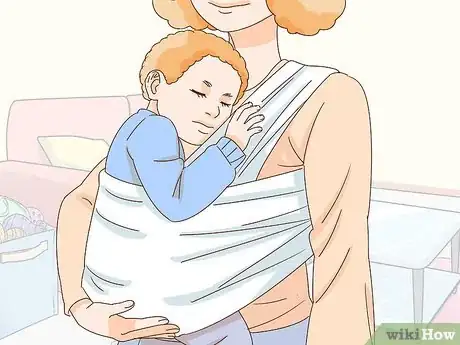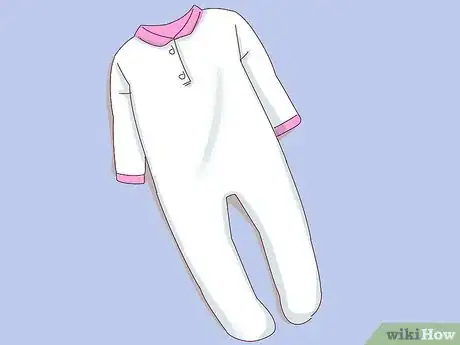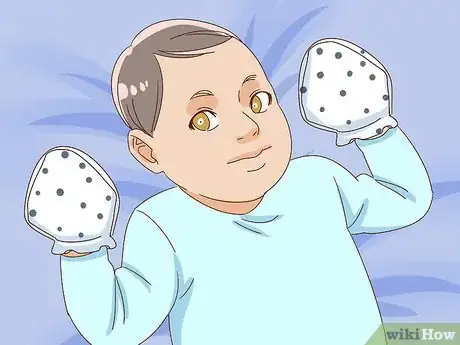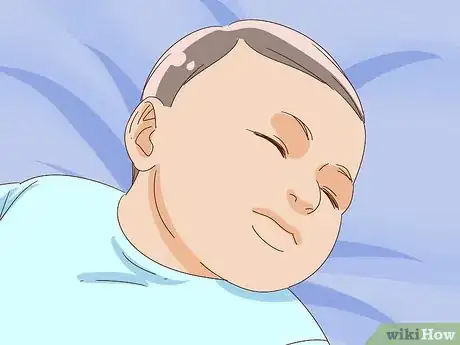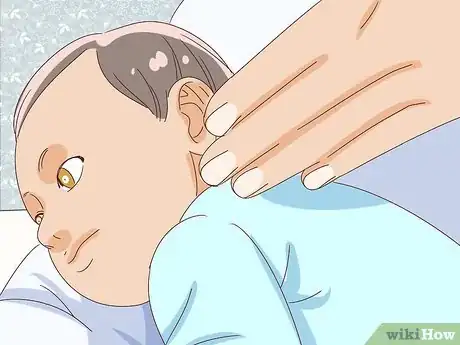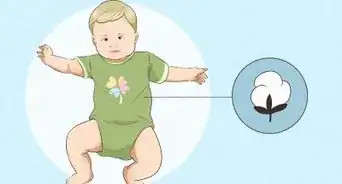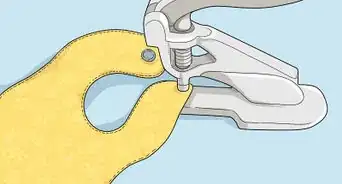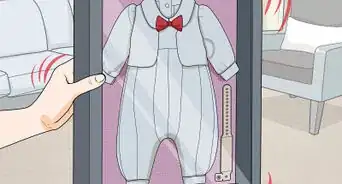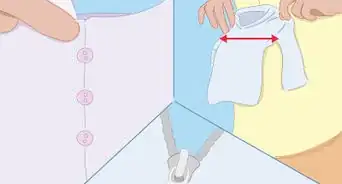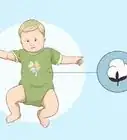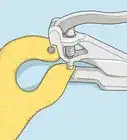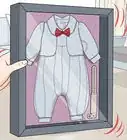This article was co-authored by Julie Wright, MFT. Julie Wright is a Marriage and Family Therapist and the co-founder of The Happy Sleeper, which offers sleep consulting and online baby sleep classes. Julie is a licensed psychotherapist specializing in babies, children, and their parents, and the co-author of two best selling parenting books (The Happy Sleeper and Now Say This) published by Penguin Random House. She created the popular Wright Mommy, Daddy and Me program in Los Angeles, California, which provides support and learning for new parents. Julie's work has been mentioned in The New York Times, The Washington Post, and NPR. Julie received her training at the Cedars Sinai Early Childhood Center.
This article has been viewed 24,819 times.
When your baby is a newborn, they aren’t able to regulate their own temperature that well, so it’s really important to help keep them cool and comfortable during the hot summer months. You’ll need to keep a close eye on them to determine if their clothes are light enough or too light, depending on the weather. It might take several weeks to learn what keeps your baby comfortable, but you will get there sooner than you think!
Steps
Keeping Your Newborn Comfortable
-
1Dress your newborn in a single layer when the temperature is over 75 °F (24 °C). Consider what you yourself are comfortable wearing when it’s hot out and use that as a guide when you’re dressing your newborn in the summer. Choose outfits made of breathable cotton fabrics to keep your baby as comfortable as possible.[1]
- For example, if you’re comfortable wearing a T-shirt and shorts, chances are your baby will be, too.
- Short-sleeved body suits made of cotton are great options for your newborn. Dress them in whatever will be easiest to get on and off for all those diaper changes!
- If your baby’s skin is flushed or if they are breathing rapidly, chances are they are too hot. Remove layers or take them indoors so they can cool down.
-
2Bring extra layers with you in case you’ll be in an air-conditioned room. Summertime can be a little tricky because outdoors, it might be 85 °F (29 °C) but inside, it could be 65 °F (18 °C). When you’re packing your newborn’s diaper bag, add a pair of long pants and a long-sleeved shirt or lightweight jacket.[2]
- Your baby will most likely need an extra layer when the temperature drops below 65 to 70 °F (18 to 21 °C).
- You’ll need extra layers if you’ll be outdoors when the temperature drops at night, too.
- Touch the back of your baby’s neck to determine if they’re too cold. If their skin is cool to the touch, you can add a layer to their outfit.
Advertisement -
3Skip the socks to avoid overheating your newborn. Socks are really important during the colder months, but during the summer, they can contribute to overheating and dehydrating your newborn. If you want to put something on their feet, opt for sandals that allow their feet to breathe.[3]
- Your newborn can only sweat from their neck, hands, feet, and head, so covering their feet really decreases their ability to self-regulate their temperature. If you cover their feet, they can’t sweat through them.
-
4Use a lightweight floppy hat to protect your newborn’s skin from the sun. Pick a hat that has a floppy rim to give your newborn a little extra protection while you’ll be out in the heat. These hats are specifically made for babies to wear in the sun, and they are made of a breathable material that will help keep your baby cool.[4]
- Your newborn’s skin is really delicate and will burn much faster than your own skin will. Try to keep them out of direct sunlight as much as you can.
- Avoid using knit caps during the summer. The material isn’t very breathable and could make your baby too hot.
Did You Know? The FDA doesn’t recommend using sunscreen on babies until they are older than 6 months. Newborns have thinner skin that can’t protect them as well from some of the chemicals that are in sunscreen and are more likely to absorb them into their system.
-
5Protect your newborn’s eyes with UV protection sunglasses. Whether you’ll be driving in the car, sitting on the beach, or simply taking a walk with your newborn, keep their eyes sheltered from the sun as much as you can. Keep an extra pair in your diaper bag in case you lose a pair so your baby will always be protected.[5]
- Remember, your baby doesn’t know to not look directly at the sun and they can’t shade their eyes themselves, so you have to take care of this for them.
-
6Opt for a breathable sling or carrier if you wear your newborn. When baby-wearing during the summer, keep in mind that your newborn will be absorbing your body heat. Dress them in minimal clothing (a simple onesie and no socks works great), and use a carrier or sling that is made of cotton. If you feel too hot in the carrier, chances are your baby is too hot.[6]
- Most brands have options for summertime or wintertime carriers to specifically keep your baby comfortable and safe.
Dressing for Sleep
-
1Dress your newborn simply when it’s warm inside. If you don’t use air conditioning or if the temperature of the room is higher than 75 °F (24 °C), a light, single layer should be enough for your newborn to sleep comfortably. If the room is under 75 °F (24 °C), your newborn might need an extra layer.[7]
- If you don't have air conditioning, you can use a fan to help keep your newborn cool.[8] If you use a standing fan in your newborn’s room, place it on the opposite side from where they’ll be sleeping. This will help regulate the temperature in the room but won’t disturb their sleep.
Tip: Help your newborn sleep more comfortably during the summer by keeping the room between 68 and 72 °F (20 and 22 °C).
-
2Opt for a long-sleeved footed onesie for nighttime if your home is air-conditioned. Always pick pajamas made of cotton. If in the night, you find that your baby is too cold, simply add a lightweight swaddle.[9]
- It might take a little bit of time to figure out what your baby likes best, but within a few weeks, you’ll be a pro at making your newborn comfortable at nighttime.
-
3Use a lightweight swaddle or sleep sack if you prefer to swaddle. Dress your baby in a simple onesie or leave them in their nappy, just depending on how warm the room is. Then secure a swaddle on top of that to wrap them up.[10]
- Never use free blankets in your newborn’s crib. They could accidentally cover your baby’s face in the nighttime.
-
4Put cotton mittens on your newborn’s hands to protect them from scratching. Newborn babies have sharp little nails and they don’t know yet to keep them away from their face. Opt for lightweight cotton mittens that fit snug on your baby’s hands so they won’t come loose during the night.[11]
- You can buy packs of mittens for $5 to $10 so you always have a clean pair for nighttime use.
-
5Keep your newborn’s head uncovered at night so they don’t overheat. During the summertime, you can skip knit caps altogether for your newborn, whether it’s daytime or nighttime. Additionally, hats can pose a choking hazard at night for your baby, so it’s best to avoid them year-round for bedtime.[12]
- Also keep your newborn’s crib free of loose blankets, pillows, and stuffed animals, and these could also be dangerous.
- Newborns are often sent home from the hospital with a little cap on their head, but it's recommended that they stop wearing the cap after a few days so they're able to regulate their body temperature.[13]
-
6Check your newborn’s temperature by touching the back of their neck. Your little one might have cold hands and feet because their blood circulation is still developing, so they aren’t a good indicator of how warm your baby truly is. Use the back of their neck as a better gauge for their comfort level. If their neck is sticky or hot, they’re too warm. If their neck is dry to the touch and cool or slightly warm, they are comfortable.[14]
- When you check on your newborn during the night for feedings and diaper changes, check their temperature, too. This will happen once every 2 to 3 hours, depending on their feeding schedule.
Expert Q&A
Did you know you can get expert answers for this article?
Unlock expert answers by supporting wikiHow
-
QuestionHow should I dress my newborn for sleep during the summer if I don't have air conditioning?
 Julie Wright, MFTJulie Wright is a Marriage and Family Therapist and the co-founder of The Happy Sleeper, which offers sleep consulting and online baby sleep classes. Julie is a licensed psychotherapist specializing in babies, children, and their parents, and the co-author of two best selling parenting books (The Happy Sleeper and Now Say This) published by Penguin Random House. She created the popular Wright Mommy, Daddy and Me program in Los Angeles, California, which provides support and learning for new parents. Julie's work has been mentioned in The New York Times, The Washington Post, and NPR. Julie received her training at the Cedars Sinai Early Childhood Center.
Julie Wright, MFTJulie Wright is a Marriage and Family Therapist and the co-founder of The Happy Sleeper, which offers sleep consulting and online baby sleep classes. Julie is a licensed psychotherapist specializing in babies, children, and their parents, and the co-author of two best selling parenting books (The Happy Sleeper and Now Say This) published by Penguin Random House. She created the popular Wright Mommy, Daddy and Me program in Los Angeles, California, which provides support and learning for new parents. Julie's work has been mentioned in The New York Times, The Washington Post, and NPR. Julie received her training at the Cedars Sinai Early Childhood Center.
Parenting & Baby Sleep Specialist
-
QuestionHow do I prevent my baby from getting overheated at night?
 Julie Wright, MFTJulie Wright is a Marriage and Family Therapist and the co-founder of The Happy Sleeper, which offers sleep consulting and online baby sleep classes. Julie is a licensed psychotherapist specializing in babies, children, and their parents, and the co-author of two best selling parenting books (The Happy Sleeper and Now Say This) published by Penguin Random House. She created the popular Wright Mommy, Daddy and Me program in Los Angeles, California, which provides support and learning for new parents. Julie's work has been mentioned in The New York Times, The Washington Post, and NPR. Julie received her training at the Cedars Sinai Early Childhood Center.
Julie Wright, MFTJulie Wright is a Marriage and Family Therapist and the co-founder of The Happy Sleeper, which offers sleep consulting and online baby sleep classes. Julie is a licensed psychotherapist specializing in babies, children, and their parents, and the co-author of two best selling parenting books (The Happy Sleeper and Now Say This) published by Penguin Random House. She created the popular Wright Mommy, Daddy and Me program in Los Angeles, California, which provides support and learning for new parents. Julie's work has been mentioned in The New York Times, The Washington Post, and NPR. Julie received her training at the Cedars Sinai Early Childhood Center.
Parenting & Baby Sleep Specialist The first thing to do if it's very warm out is to make sure that you don't overdress your baby. Newborns come home from the hospital, often with a little cap on but the recommendation is not to wear that for more than the first few days because very quickly, the infant body learns to regulate temperature and having their head bare is part of how they regulate temperature. It's a myth that babies need to be double-wrapped and overdressed. That can actually be a safety issue. Also, babies sleep better when the air is cool, so a prevention tip is to keep the air nice and cool.
The first thing to do if it's very warm out is to make sure that you don't overdress your baby. Newborns come home from the hospital, often with a little cap on but the recommendation is not to wear that for more than the first few days because very quickly, the infant body learns to regulate temperature and having their head bare is part of how they regulate temperature. It's a myth that babies need to be double-wrapped and overdressed. That can actually be a safety issue. Also, babies sleep better when the air is cool, so a prevention tip is to keep the air nice and cool.
Warnings
- Avoid overdressing your newborn during the summer. It's a myth that babies need to be overdressed and wrapped up a lot.[15]⧼thumbs_response⧽
References
- ↑ https://www.whattoexpect.com/baby-health-and-safety/dress-newborn.aspx
- ↑ https://www.whattoexpect.com/baby-health-and-safety/dress-newborn.aspx
- ↑ https://www.kidspot.com.au/health/baby-health/newborn-care/how-to-dress-your-baby-for-summer/news-story/c0c4345efdca3a868b7674e99b3db198
- ↑ https://www.whattoexpect.com/baby-health-and-safety/dress-newborn.aspx
- ↑ https://www.whattoexpect.com/baby-health-and-safety/dress-newborn.aspx
- ↑ https://www.whattoexpect.com/baby-health-and-safety/dress-newborn.aspx
- ↑ https://raisingchildren.net.au/babies/sleep/sleep-safety/dressing-for-bed
- ↑ Julie Wright, MFT. Parenting & Baby Sleep Specialist. Expert Interview. 6 March 2020.
- ↑ https://www.babble.com/baby/what-should-my-baby-wear-to-sleep/
- ↑ https://raisingchildren.net.au/babies/sleep/sleep-safety/dressing-for-bed
- ↑ https://www.sleep.org/articles/what-babies-should-wear-to-sleep/
- ↑ https://raisingchildren.net.au/babies/sleep/sleep-safety/dressing-for-bed
- ↑ Julie Wright, MFT. Parenting & Baby Sleep Specialist. Expert Interview. 6 March 2020.
- ↑ https://www.kidspot.com.au/health/baby-health/newborn-care/how-to-dress-your-baby-for-summer/news-story/c0c4345efdca3a868b7674e99b3db198
- ↑ Julie Wright, MFT. Parenting & Baby Sleep Specialist. Expert Interview. 6 March 2020.
